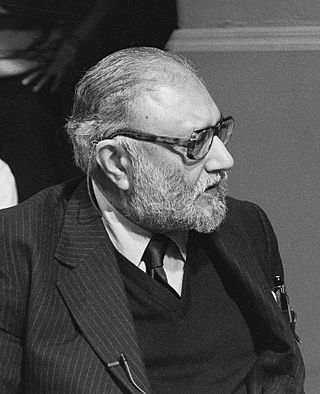
Mohammad Abdus Salam was a Pakistani theoretical physicist. He shared the 1979 Nobel Prize in Physics with Sheldon Glashow and Steven Weinberg for his contribution to the electroweak unification theory. He was the first Pakistani and the first scientist from an Islamic country to receive a Nobel Prize and the second from an Islamic country to receive any Nobel Prize, after Anwar Sadat of Egypt.

Lisa Randall is an American theoretical physicist and Frank B. Baird, Jr. Professor of Science at Harvard University. Her research includes the fundamental forces of nature and dimensions of space. She studies the Standard Model, supersymmetry, possible solutions to the hierarchy problem concerning the relative weakness of gravity, cosmology of dimensions, baryogenesis, cosmological inflation, and dark matter. She contributed to the Randall–Sundrum model, first published in 1999 with Raman Sundrum.

The Joint Institute for Nuclear Research, in Dubna, Moscow Oblast, Russia, is an international research center for nuclear sciences, with 5,500 staff members including 1,200 researchers holding over 1,000 Ph.Ds from eighteen countries. Most scientists are scientists of the Russian Federation.

The National Academy of Sciences of Ukraine is a self-governing state-funded organization in Ukraine that is the main center of development of science and technology by coordinating a system of research institutes in the country. It is the main research oriented organization along with the five other academies in Ukraine specialized in various scientific disciplines. NAS Ukraine consists of numerous departments, sections, research institutes, scientific centers and various other supporting scientific organizations.

Nikolay Nikolayevich Bogolyubov was a Soviet, Ukrainian and Russian mathematician and theoretical physicist known for a significant contribution to quantum field theory, classical and quantum statistical mechanics, and the theory of dynamical systems; he was the recipient of the 1992 Dirac Medal.

The Abdus Salam International Centre for Theoretical Physics (ICTP) is a research center for physical and mathematical sciences, located in Trieste, Friuli-Venezia Giulia, Italy.

Giorgio Parisi is an Italian theoretical physicist, whose research has focused on quantum field theory, statistical mechanics and complex systems. His best known contributions are the QCD evolution equations for parton densities, obtained with Guido Altarelli, known as the Altarelli–Parisi or DGLAP equations, the exact solution of the Sherrington–Kirkpatrick model of spin glasses, the Kardar–Parisi–Zhang equation describing dynamic scaling of growing interfaces, and the study of whirling flocks of birds. He was awarded the 2021 Nobel Prize in Physics jointly with Klaus Hasselmann and Syukuro Manabe for groundbreaking contributions to theory of complex systems, in particular "for the discovery of the interplay of disorder and fluctuations in physical systems from atomic to planetary scales".

Marc, Baron Henneaux is a Belgian theoretical physicist and professor at the Université Libre de Bruxelles (ULB) who was born in Brussels on 5 March 1955.
The Bogoliubov Prize for young scientists is an award offered to young researchers in theoretical physics by the Joint Institute for Nuclear Research (JINR), an international intergovernmental organization located in Dubna, Russia. The award is issued in memory of the physicist and mathematician Nikolay Bogoliubov.
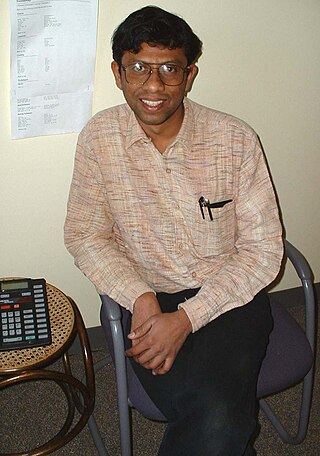
Rajesh Gopakumar is an Indian theoretical physicist and the director of the International Centre for Theoretical Sciences in Bangalore, India. He was previously a professor at Harish-Chandra Research Institute (HRI) in Prayagraj, India. He is known for his work on topological string theory.

Aurélien Barrau is a French physicist and philosopher, specialized in astroparticle physics, black holes and cosmology. He is the director of the Grenoble Center for Theoretical Physics, works in the CNRS Laboratory for Subatomic Physics and Cosmology (LPSC), and is a professor at the Joseph Fourier University.
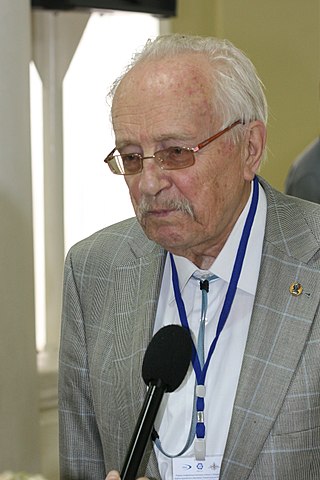
Dmitry Vasil'evich Shirkov was a Russian theoretical physicist, known for his contribution to quantum field theory and to the development of the renormalization group method.

Ganapathy Baskaran is an Indian theoretical physicist, known for his work on condensed matter physics and strongly correlated quantum materials. Baskaran is an Emeritus Professor of physics at the Institute of Mathematical Sciences in Chennai, India and holds a Distinguished Visiting Research Chair at the Perimeter Institute for Theoretical Physics in Waterloo, Canada. Recently he became a Distinguished Professor at the Indian Institute of Technology, Madras (Chennai), India.
The Breakthrough Prize in Fundamental Physics is one of the Breakthrough Prizes, awarded by the Breakthrough Prize Board. Initially named Fundamental Physics Prize, it was founded in July 2012 by Russia-born Israeli entrepreneur, venture capitalist and physicist Yuri Milner. The prize is awarded to physicists from theoretical, mathematical, or experimental physics that have made transformative contributions to fundamental physics, and specifically for recent advances.
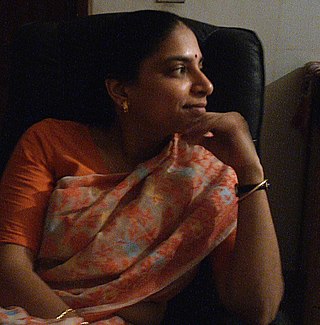
Charusita Chakravarty was an Indian academic and scientist. She was a professor of chemistry at the Indian Institute of Technology, Delhi since 1999. In 2009 she was conferred Shanti Swarup Bhatnagar Prize for Science and Technology in the field of chemical science. In 1999, she received B.M. Birla Science Award. She was an Associate Member of the Centre for Computational Material Science, Jawaharlal Nehru Centre for Advanced Scientific Research, Bangalore.
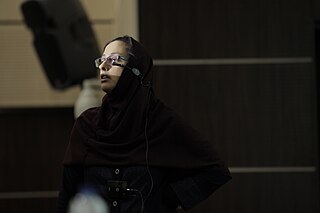
Yasaman Farzan is an Iranian researcher. She is a faculty member of Institute for Research in Fundamental Sciences.
Deepak Dhar is an Indian theoretical physicist known for his research on statistical physics and stochastic processes. In 2022, he became the first Indian to be awarded the Boltzmann Medal, the highest recognition in statistical physics awarded once every three years by IUPAP, for exceptional contributions to the subject.
Rahul Pandit is an Indian condensed matter physicist, a professor of physics and a divisional chair at the Indian Institute of Science. Known for his research on phase transitions and spatiotemporal chaos and turbulence, Pandit is an elected fellow of the Indian Academy of Sciences, Indian National Science Academy and The World Academy of Sciences. The Council of Scientific and Industrial Research, the apex agency of the Government of India for scientific research, awarded him the Shanti Swarup Bhatnagar Prize for Science and Technology, one of the highest Indian science awards, for his contributions to physical sciences in 2001.

Atish Dabholkar is an Indian theoretical physicist. He is currently the Director of the Abdus Salam International Centre for Theoretical Physics (ICTP) with the rank of Assistant Director-General, UNESCO. Prior to that, he was head of ICTP's High Energy, Cosmology and Astroparticle Physics section, and also Directeur de Recherche at the Centre National de la Recherche Scientifique (CNRS) at Sorbonne University in the "Laboratoire de Physique Théorique et Hautes Énergies" (LPTHE).
Claudia de Rham is a British theoretical physicist of Swiss origin working at the interface of gravity, cosmology, and particle physics. She is based at Imperial College London. She was one of the UK finalists in the Physical Sciences and Engineering category of the Blavatnik Award for Young Scientists in 2018 for revitalizing the theory of massive gravity and won the award in 2020.














